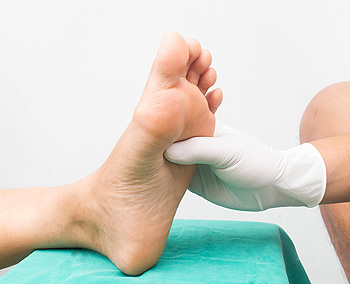
Choosing the right walking shoes is essential for maintaining foot health and overall comfort during daily activities. A good walking shoe should have a low heel to promote stability and reduce strain on the feet. It is important to ensure there is enough wiggle room in the toe box so that toes can move freely without feeling cramped. Taking a test walk around the store can help determine if the shoes provide adequate support, cushioning, and fit. It is also helpful to shop later in the day when feet are slightly swollen, as this reflects their true size during regular use. If you enjoy walking, it is important to wear the right type of shoes, or foot pain may develop. If this has happened to you, it is suggested that you contact a podiatrist who can treat various foot conditions.
Getting the right shoe size is an important part of proper foot health. Seek the assistance of Dr. Odin De Los Reyes from Connecticut. Our doctor will provide the care you need to keep you pain-free and on your feet.
Getting the Right Shoe Size
There are many people who wear shoes that are the incorrect size, negatively affecting their feet and posture. Selecting the right shoes is not a difficult process, so long as you keep several things in mind when it comes to choosing the right pair.
- When visiting the shoe store, use the tools available to measure your foot.
- Be sure there is ‘wiggle room’. There should be about an inch between your toes and the tip of your shoes.
- Do not always assume you are the same size, as manufacturers run differently.
- Purchase shoes later in the day, as your feet swell as the day progresses.
- If a shoe is not comfortable, it is not suitable. Most shoes can’t be ‘broken in’, and comfort should be the ultimate goal when it comes to choosing the right pair of shoes
As our feet hold our body weight and keep us moving, it is important to treat them right. Picking the right pair of shoes can provide your feet comfort and mobility without pain.
If you have any questions, please feel free to contact our offices located in Southbury and Farmington, CT . We offer the newest diagnostic and treatment technologies for all your foot care needs.

Flexible flatfoot in children occurs when the arch of the foot appears flattened during standing or walking but returns when the child is sitting or standing on tiptoe. This type of flatfoot is usually caused by laxity in ligaments and is often painless. However, some children may experience foot pain during physical activity or after long periods of standing. A podiatrist can determine whether the flatfoot is flexible or rigid through physical examination, and in some cases, digital imaging scans may be needed. Flexible flatfoot in children often improves naturally as the child matures, but treatment may be necessary if pain, fatigue, or gait abnormalities develop. In severe or persistent cases, surgery may be considered to correct deformities, especially when there is a shortened tendon or structural misalignment of the foot. If your child is complaining of foot pain that may be caused by flat feet, it is suggested that you make an immediate appointment with a podiatrist for a diagnosis and treatment options.
Flatfoot is a condition many people suffer from. If you have flat feet, contact Dr. Odin De Los Reyes from Connecticut. Our doctor will treat your foot and ankle needs.
What Are Flat Feet?
Flatfoot is a condition in which the arch of the foot is depressed and the sole of the foot is almost completely in contact with the ground. About 20-30% of the population generally has flat feet because their arches never formed during growth.
Conditions & Problems:
Having flat feet makes it difficult to run or walk because of the stress placed on the ankles.
Alignment – The general alignment of your legs can be disrupted, because the ankles move inward which can cause major discomfort.
Knees – If you have complications with your knees, flat feet can be a contributor to arthritis in that area.
Symptoms
- Pain around the heel or arch area
- Trouble standing on the tip toe
- Swelling around the inside of the ankle
- Flat look to one or both feet
- Having your shoes feel uneven when worn
Treatment
If you are experiencing pain and stress on the foot you may weaken the posterior tibial tendon, which runs around the inside of the ankle.
If you have any questions please feel free to contact our offices located in Southbury and Farmington, CT . We offer the newest diagnostic and treatment technologies for all your foot and ankle needs.

A biomechanical assessment of the feet and ankles evaluates how they function during movement. Podiatrists use this exam to identify issues like abnormal gait patterns, misalignment, or imbalances that may contribute to pain or injury. The assessment typically begins with a static evaluation, where a podiatrist examines foot posture, arch height, and weight distribution while standing. Next comes a dynamic assessment, analyzing how the feet move during walking or running. This may involve video gait analysis or pressure mapping technology. Joint mobility, muscle strength, and flexibility are also tested. Findings from the assessment help determine if orthotics, footwear changes, or strengthening exercises are needed. If you would like to better understand foot pain, injury prevention, or athletic performance enhancement, it is suggested that you see a podiatrist for a biomechanical assessment.
If you have any concerns about your feet, contact Dr. Odin De Los Reyes from Connecticut. Our doctor can provide the care you need to keep you pain-free and on your feet.
Biomechanics in Podiatry
Podiatric biomechanics is a particular sector of specialty podiatry with licensed practitioners who are trained to diagnose and treat conditions affecting the foot, ankle and lower leg. Biomechanics deals with the forces that act against the body, causing an interference with the biological structures. It focuses on the movement of the ankle, the foot and the forces that interact with them.
A History of Biomechanics
- Biomechanics dates back to the BC era in Egypt where evidence of professional foot care has been recorded.
- In 1974, biomechanics gained a higher profile from the studies of Merton Root, who claimed that by changing or controlling the forces between the ankle and the foot, corrections or conditions could be implemented to gain strength and coordination in the area.
Modern technological improvements are based on past theories and therapeutic processes that provide a better understanding of podiatric concepts for biomechanics. Computers can provide accurate information about the forces and patterns of the feet and lower legs.
Understanding biomechanics of the feet can help improve and eliminate pain, stopping further stress to the foot.
If you have any questions please feel free to contact our offices located in Southbury and Farmington, CT . We offer the newest diagnostic and treatment technologies for all your foot and ankle needs.

Diabetic neuropathy is a complication of diabetes that affects the nerves in the feet and legs, leading to numbness, tingling, burning, or sharp pain. As nerve damage progresses, it can reduce sensation, making it difficult to feel cuts, blisters, or sores. This can lead to infections, ulcers, or deformities like hammertoe, where the toes become bent or misaligned. The primary cause of diabetic neuropathy is high blood sugar levels over time, which can damage both blood vessels and nerves. Poor circulation combined with nerve damage increases the risk of developing foot ulcers and deformities, which may become severe if left untreated. A podiatrist can help manage diabetic neuropathy by providing regular foot exams, treating ulcers, and recommending special footwear or custom orthotics to prevent further damage. They can also assist with managing hammertoe and other foot deformities. If you are dealing with diabetic neuropathy, it is suggested that you make an appointment with a podiatrist.
Neuropathy
Neuropathy can be a potentially serious condition, especially if it is left undiagnosed. If you have any concerns that you may be experiencing nerve loss in your feet, consult with Dr. Odin De Los Reyes from Connecticut. Our doctor will assess your condition and provide you with quality foot and ankle treatment for neuropathy.
What Is Neuropathy?
Neuropathy is a condition that leads to damage to the nerves in the body. Peripheral neuropathy, or neuropathy that affects your peripheral nervous system, usually occurs in the feet. Neuropathy can be triggered by a number of different causes. Such causes include diabetes, infections, cancers, disorders, and toxic substances.
Symptoms of Neuropathy Include:
- Numbness
- Sensation loss
- Prickling and tingling sensations
- Throbbing, freezing, burning pains
- Muscle weakness
Those with diabetes are at serious risk due to being unable to feel an ulcer on their feet. Diabetics usually also suffer from poor blood circulation. This can lead to the wound not healing, infections occurring, and the limb may have to be amputated.
Treatment
To treat neuropathy in the foot, podiatrists will first diagnose the cause of the neuropathy. Figuring out the underlying cause of the neuropathy will allow the podiatrist to prescribe the best treatment, whether it be caused by diabetes, toxic substance exposure, infection, etc. If the nerve has not died, then it’s possible that sensation may be able to return to the foot.
Pain medication may be issued for pain. Electrical nerve stimulation can be used to stimulate nerves. If the neuropathy is caused from pressure on the nerves, then surgery may be necessary.
If you have any questions, please feel free to contact our offices located in Southbury and Farmington, CT . We offer the newest diagnostic and treatment technologies for all your foot care needs.
